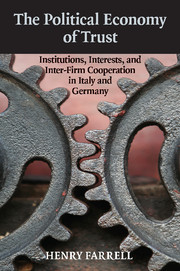 The Political Economy of Trust
The Political Economy of Trust Book contents
- Frontmatter
- Contents
- Acknowledgments
- 1 Introduction
- 2 A Theory of Institutions and Trust
- 3 Varieties of Capitalism and Industrial Districts
- 4 Trust and Institutions in Industrial Districts
- 5 Accounting for Change in Informal Institutions
- 6 Informal Institutions without Trust: Relations among Mafiosi in Sicily
- 7 Conclusions
- Bibliography
- Index
- Titles in the series
1 - Introduction
Published online by Cambridge University Press: 24 September 2009
- Frontmatter
- Contents
- Acknowledgments
- 1 Introduction
- 2 A Theory of Institutions and Trust
- 3 Varieties of Capitalism and Industrial Districts
- 4 Trust and Institutions in Industrial Districts
- 5 Accounting for Change in Informal Institutions
- 6 Informal Institutions without Trust: Relations among Mafiosi in Sicily
- 7 Conclusions
- Bibliography
- Index
- Titles in the series
Summary
A POLITICAL ECONOMY OF TRUST
What are the sources of trust and cooperation in political and economic life? This question lies at the heart of key debates within political science. However, it remains unresolved, in large part because of serious weaknesses in our understanding of the relationship between social structure, trust, and cooperation.
These weaknesses are not the result of neglect by political scientists. The two dominant approaches to the explanation of comparative politics, political culture and rational choice, both place trust and cooperation at the core of their research agenda. Yet there is something unsatisfying about the arguments that they offer. Scholars of political culture have almost uniformly concerned themselves with macrolevel arguments based on aggregate survey data. Their arguments have scanty microfoundations, a rather serious problem if one wishes to explain how individuals may come to trust each other and thus cooperate. Rational choice scholars have constructed models with clearly specified microfoundations, but they have had great difficulty to date in building mid-level theories that can capture the consequences of institutions and other such broader phenomena for trust. All too often, rational choice scholars implicitly or explicitly equate trust with simple institution-induced expectations, a move which nonrational choice scholars (correctly) view as reductionist.
In this book, I try to set out the beginnings of an alternative approach to the understanding of the “political economy” of trust; that is, of the relationship between institutions, trust, and cooperation in economic interactions. My account builds upon the basic foundations of rational choice theory.
- Type
- Chapter
- Information
- The Political Economy of TrustInstitutions, Interests, and Inter-Firm Cooperation in Italy and Germany, pp. 1 - 22Publisher: Cambridge University PressPrint publication year: 2009
